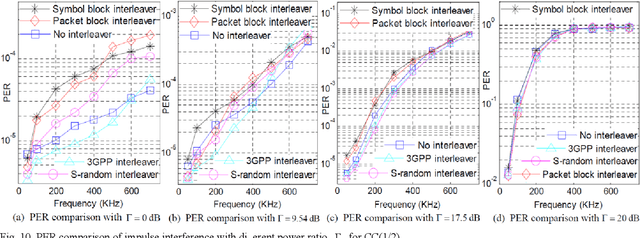Short-Packet Interleaver against Impulse Interference in Practical Industrial Environments
Paper and Code
Mar 01, 2022



The most common cause of transmission failure in Wireless High Performance (WirelessHP) target industry environments is impulse interference. As interleavers are commonly used to improve the reliability on the Orthogonal Frequency Division Multiplexing (OFDM) symbol level for long packet transmission, this paper considers the feasibility of applying short-packet bit interleaving to enhance the impulse/burst interference resisting capability on both OFDM symbol and frame level. Using the Universal Software Radio Peripherals (USRP) and PC hardware platform, the Packet Error Rate (PER) performance of interleaved coded short-packet transmission with Convolutional Codes (CC), Reed-Solomon codes (RS) and RS+CC concatenated codes are tested and analyzed. Applying the IEEE 1613 standard for impulse interference generation, extensive PER tests of CC(1=2) and RS(31; 21)+CC(1=2) concatenated codes are performed. With practical experiments, we prove the effectiveness of bit in terleaved coded short-packet transmission in real factory environments. We also investigate how PER performance depends on the interleavers, codes and impulse interference power and frequency.
 Add to Chrome
Add to Chrome Add to Firefox
Add to Firefox Add to Edge
Add to Edge